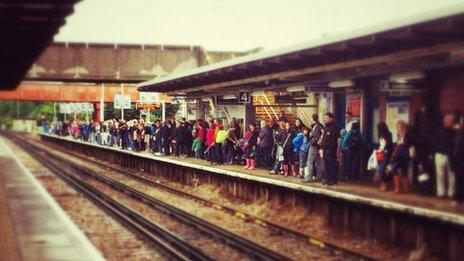Diamond Jubilee: How did London's transport system cope?
- Published
So how did London cope?
Transport for London (TfL) certainly seem pretty pleased with how it has gone so far.
The main reason is that Londoners listened to the messages that they put out - i.e don't drive into central London.
That means traffic was 40% down on a normal Sunday. Passengers on public transport went up 25%.
Some Tube stations switched to exit only as would be expected but there were other issues.
For example St James' station had a problem with platform equipment and had to close.
Also repairs to the London Overground took all day after a power failure. That will be a concern, as the speed of recovery will be vital during the Olympics.
But in the main it seems the Tube and roads coped pretty well.
Not prepared
The train companies fared a lot worse.
Many simply were not prepared for the numbers of travellers on the Sunday. Some ran only an enhanced Sunday service; trains, unsurprisingly, were packed.
There are bound to be questions now about how the train companies came to the conclusion that an enhanced Sunday service could cope.
Who did the modelling? On what were the numbers based?
Did the train companies engage with the Met Police and TfL who seemed to correctly predict the numbers?
Was the lack of capacity a financial decision?
A spokesperson for the Association of Train Operating Companies (Atoc) said: "There were extra services and extra carriages to get people to and from London yesterday.
"But operators have to make a call on how many services to run based on projected demand well in advance.
"Clearly in instances where overcrowding did cause problems, operators would apologise to passengers."
The lack of capacity on rail meant crowd control systems were implemented at a number of mainline stations.
Expect to see much more of that this summer. And remember the Olympics will be a much bigger test of the transport system spread over two weeks.
The key message will be to avoid the hot spots and use less busy routes.
Transport chiefs did not want to call it publicly a dry run for the Olympics - but it was.
Am I being fair? Let me know your experiences.
- Published3 June 2012
